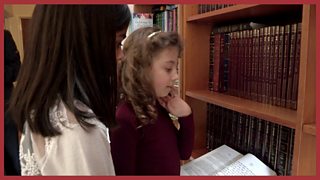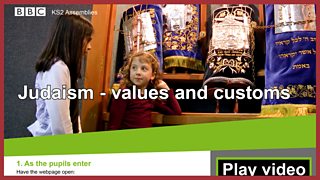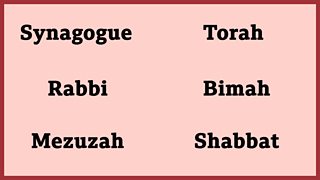Judaism
Themes: World religions; Judaism; Jewish culture; Jewish festivals.
Summary: This assembly could be scheduled close to a Jewish festival or as part of a school focus on diversity and equality. Jews believe there is only one God, who created the world. Jews follow the teachings of the Torah, given by God to the prophet Moses. Jews worship in a synagogue, under the guidance of a rabbi. Jews observe a weekly day of rest - 'shabbat' - to make time for God and family.
Resources: an image summarising (see 'Key links').
Key links
-
![]()
Print out the assembly framework ready for use
-
![]()
An image showing Jewish words used in the video clip
The video:

Temima, from a Jewish family, invites her friend Shaeya to visit. Shaeya's family are Hindus and the two friends discover more about one another's faiths. As they make and share a meal, Temima explains Jewish people have special rules about food and won't mix milk and meat. In Shaeya's home, they don't eat meat at all. Temima's father, a rabbi, takes them to the synagogue to see the Torah, the Jewish holy book. The girls discuss shabbat, the Jewish day of rest and the importance of prayer in their faiths. They compare religious symbols too: in Temima's home, the Mezuzah, a roll of parchment with a prayer, is fixed to doors; in Shaeya's home, a Ganesha idol at the front door welcomes visitors.
Duration: 4' 55"
End of speech: '... and it's been fun meeting Shaeya and learning what being a Hindu means to her'.
Video questions
What is the name of the building where Temima and her family worship?
A synagogue
What is the Torah?
A holy book of the Jewish people
What language is the Torah written in?
Hebrew
Where in a synagogue is the Torah kept?
An ark
What does Temima have outside her bedroom door?
A mezuzah - a piece of parchment attached to the wall with a prayer from the Torah, which is common in Jewish homes
What is shabbat?
A weekly day of rest for followers of Judaism
Suggested framework
| Content | Guidance |
|---|---|
| 1. Entry music | A good choice is the Jewish song of greeting and parting: 'Shalom my friend'. Search for a clip online using the term 'Shalom my friend'. |
| 2. Introduction | Tell the assembly: 'The song we heard as we came in - 'Shalom my friend' - is a Jewish song of greeting and parting. Does anyone know what the word shalom means?' Establish that 'shalom' is a word in the ancient Jewish language of Hebrew and means 'peace' or 'peace be upon you'. It's a way of wishing another person well. Ask the pupils to name religious faiths they have heard of. Compile a list, guiding pupils to include all the major world religions: Buddhism, Christianity, Hinduism, Islam, Judaism and Sikhism. Point out: 'Some of us follow one religion with our families; some of us follow another and some of us follow no religion at all. But whatever our family's religious faith may be, it's important - and interesting and fun - to find out more about the faith of our friends and neighbours. Discovering what matters to others helps us all to value and respect one another and to get on well together.' |
| 3. The video | Tell the assembly: 'In this video clip, two friends from different faiths find out more about each other's lives.' Play the video. The duration is 4' 55" and the final words are: '...and it's been fun meeting Shaeya and learning what being a Hindu means to her.' |
| 4. After the video | Ask pupils to turn to the people around them and wish them well by saying 'Shalom, my friend!' |
| 5. Time to talk | Ask: 'What do you think is the most important thing the girls in the video clip learned?' [Gather responses. These might include: details of the girls' respective faiths / or 'to value and respect one another's beliefs' / or 'that they had a lot in common' / or 'the value of sharing and the pleasure you can get from sharing ideas with someone else.'] Ask: 'If the girls had visited the home of some of us who follow another religion, what might they have seen, or eaten, or found out, or talked about?' [Gather ideas and suggestions. These might include mentions of prayers / or special foods / or words or signs of greeting / or holy books or religious symbols.] Close the discussion by recapping the point: 'Discovering what matters to others helps us all to value and respect one another and to get on well together.' Remind the children of the meaning of 'shalom' - a peaceful wish from one friend to another. |
| 6. Opportunity to sing | If your assembly is to include a song this would be a good time for it. Suggestions from ΒιΆΉΤΌΕΔ collections below. |
| 7. Opportunity to reflect | Make sure everyone is quiet and listening carefully. 'We are all different, but we are all capable of friendship, sharing and respect. If we respect others, then they will respect us in return. That's how friendship and sharing work. We are all different, but we are all together in one school community.' |
| 8. Opportunity for prayer | Use your standard form of address (Dear God, Lord Jesus, etc) and: βWe thank you for our friends. Help us to value and respect the things that matter to them and to share with them true friendship in return. Amen.β |
Suggested songs
| Song | Collection | Significant words |
|---|---|---|
| 'Shalom' | Come and Praise, no 141 | 'Shalom / May peace be with you / Throughout your days' |
| Video: 'Peace is flowing like a river' (see Related links) | Come and Praise, no 144 | 'Peace is flowing like a river / Flowing out through you and me / Spreading out into the desert / Setting all the people free.' |
| Video: 'Keep the golden rules' (see Related links) | All about our school, no 5 | 'Show respect for one another / And different points of view / And take good care of each other / In everything we do.' |
| Video: 'Being a friend' (see Related links) | All about our school, no 8 | 'Whatever we grow up to be / And live in harmony / Together we all need to see / That friendship is the key!' |


